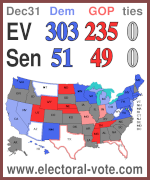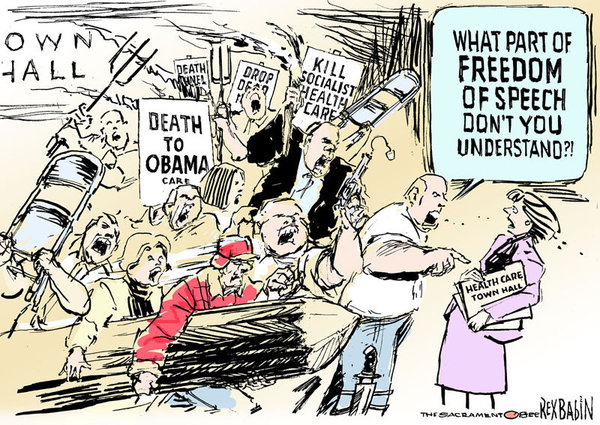I like this comic not just because of the irony, but because it raises the question of when does free speech end and offensive speech begin. We all understand that yelling “fire” in a crowded theater is not about free speech, nor is encouraging others to perform illegal acts. But that boundary is very very fuzzy. Like most really good questions, I don’t have an answer for it.
-
‹ Home
Info
-
Subscribe
-
Users
Links
- All Hat No Cattle
- Andy Borowitz
- Axios
- Barry Deutsch
- Bearman Cartoons
- Beau of the Fifth Column
- Capitol Steps
- Cook Political Report
- Crooks and Liars
- Daily Kos Comics
- Daily Show
- David Horsey
- Derf City
- Digby
- Eclectablog
- Electoral Vote
- Fair and Unbalanced
- Fark Politics
- Five Thirty Eight Politics
- Funny or Die
- Funny Times
- Go Comics
- Hackwhackers
- Heather Cox Richardson
- HuffPost Comedy
- John Fugelsang
- Kung Foo Monkey
- Last Week Tonight
- Margaret and Helen
- Mark Fiore
- Matt Davies
- Matt Wuerker
- McClatchy Cartoons
- News of the Weird
- O'Carl's Law
- Politicususa
- PolitiFact
- Propaganda Professor
- Raging Pencils
- Randy Rainbow
- RCP Cartoons
- Saturday Night Live
- Slowpoke
- Stonekettle Station
- Ted Rall
- The Nib
- The Onion
- Tom the Dancing Bug
- Tom Toles
- USN Political Cartoons
- What Now Toons
-
Tags
Abortion Bush Campaign Finance Cheney Climate Clinton Congress Conservatives Corporations Corruption Deficits Democrats Drugs Economy Education Election Elections Energy Environment Fox News Gays Guns Health Immigration Lies McCain Media Middle East Obama Palin Protests Racism Religion Republicans Romney Spying Supreme Court Taxes Tea Party Terrorism Terrorists Torture Trump Unemployment War
-
Archives

You are Visitor #


11 Comments
There is a difference between the idea of free speech, where everyone can say what they want, and screaming to deny others from talking.
At a public meeting each person must take their turn. Speaking out of turn is not a right, it is disruptive. Drowning out others is not a right, it is just rude and bullying.
And yet, I wasn’t upset when anti-war protestors have used screaming to disrupt white-washed meetings. So I would be reluctant to make screaming, even screaming that denies others from talking, illegal.
I’m not comfortable with the idea that “free speech” ends when it becomes “offensive speech”.
The U.S. is alone in the reach of our speech protections. I’m not sure we’re better off because of it. I can introduce you to the families of two Latin American immigrants who were beaten to death. I have no doubt that the pervasive “free speech” denigrating immigrants was involved in dehumanizing these people in the eyes of their (teenage) killers and giving them the license to do what they did.
I don’t know that I would draw the line at “offensive”. But I think limits on hate speech may be sensible.
Starluna wrote, “The U.S. is alone in the reach of our speech protections.” I would contend that because we err on the side of “free”, we ARE better off for it. I believe that is one thing that makes us special.
I tend to agree with Sammy on this one. Words don’t kill, people do. If we were to regulate speech what standard would we use, anyway?
But that’s not the point. We already do regulate free speech, and rightly so (no yelling fire in a crowded theater). The questions is not whether or not to regulate free speech, the question is how — or just where to draw the line.
ah, the clear and present danger standard. I’m a little dusty on my constitutional law, but if I recall, there is a distinction between speech that lacks any intellectual value [obscenity, kiddie porn], offensive/hate speech, and educational speech. One of the reasons I hated studying free speech so much was perhaps the lack of any concrete standard–it all depended on who was on the court and what the justices ate for breakfast. In a lot of the “lowest class” of speech cases the court didn’t even decide on speech issues, it went to other issues [i.e. zoning regulations]. [I know this isn’t really much of anything except a con law review, but perhaps it illustrates your point, IK – that the questions really is how or where to draw “the line”, and that maybe there is no line because we’re just plain scared to draw it]
Free speech ends when it denies free speech to the other guy.
I would disagree that words do not matter. If they didn’t we wouldn’t have such a commitment to free speech to begin with. If words did not matter, we wouldn’t have defamation and libel laws. What I find very interesting is that there are stronger laws prohibiting a business from “misrepresenting” another business than there are addressing speech that dehumanizing entire groups of people.
Words themselves may not kill, just as guns do not, by themselves, kill. But words can terrorize, humiliate and degrade. We’ve been down this road before. As Bruce Springsteen says, “where it’s headed everybody knows.”
In a couple of Michel Rosenfeld’s books on legal pragmatism, he talks about the “paradox of tolerance.” In a tolerant society, the intolerant can take advantage of broad speech protections in order to spread extremist and hateful views (or in this case lies). If enough people are persuaded by this speech, the intolerant (or the liars) can rise to positions of power and either oppress or eliminate the tolerant.
The problem this paradox raises is: if a society wants to continue to be tolerant, should it always be tolerant to all views? Which raises the more fundamental question: what justifies the value of free speech over other social values?
I must revise, or rather add to, my last comment. It turns out that it was Karl Popper who first wrote about the Paradox of Tolerance. I found one quote from the book that might be of interest:
http://blogs.rny.com/sbw/stories/storyReader$450